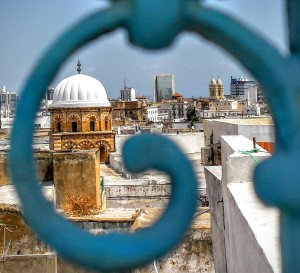Tunisia’s War on Imams: The Secularists’ Dilemma
“I know the imam of that Mosque. I know him well. He’s a criminal. He’s a filthy scumbag…. They’re all still there. They’re still recruiting for Syria. I’ve told everyone but nobody listens.” Mohamed Sahbeni is infuriated. His son, Walid, was killed in a suicide bomb attack in Mosul, Iraq, after having been radicalized in the local mosque of his village of Serjene in northern Tunisia. Mohamed blames Tunisia’s Muslim leaders for their recruitment of young, impressionable, and often unemployed Tunisians.
With an estimated 3,000 jihadist foreign fighters combating for the group known as the Islamic State (IS) in Iraq and Syria, Tunisia is the largest per capita contributor for the jihad in the world. Even so, the Tunisian government claims that, since the emergence of the Islamic terrorist group, it has prevented some 12,490 nationals from “leaving Tunisian territory to combat zones.” Yet the government’s efforts did not prevent this year’s two terrorist attacks on Tunisian soil that led to the deaths of 62 people, most of whom were Western tourists.
Radicalization by local imams has become a national security threat. In turn, its eradication has developed into a governmental priority. Over the past few months, the government has engaged in a “long-term fight” to control Tunisia’s 5,000 mosques. In the middle of this year’s Ramadan, it forcibly closed 80 mosques and dismissed two imams. After a period of relative passivity following the closures, the Ministry of Religious Affairs has decided to resume the attack on religious leaders.
On October 17, the Ministry announced the dismissal of Ridha Jaouadi, the lead imam of the Sidi Lakhmi mosque in the southern city of Sfax. For three consecutive Fridays, local worshippers protested in front of the mosque with bladed weapons and prevented the newly appointed imam from preaching. After several clashes, security forces arrested seven protesters.
A few days later, the President of the Association for the Conservation of the Mosque, the association’s treasurer, and Jaouadi himself were arrested on charges of embezzlement. Other members of the association claimed that Jaouadi was responsible for the financial scam. Nevertheless, all of the accused have since been released.
The arrests spurred further social unrest in an already unstable region and may lead to tensions between the two main parties of the government coalition, the secular Nidaa Tounes and the Islamic Ennahda. The leadership of the Islamic Ennahda party strongly condemned Jaouadi’s arrest and warned against “those who wish to undermine the stability of the country through the sowing of discord.” On the other hand, the anti-Islamist online newspaper Kapitalis criticized the Ennahda party for supporting Jaouadi and claims that it is engaging in a “‘politique du grand écart’ with one foot in government and one hand extended to criminals.”
The interpretation of the Jaouadi case as a governmental plot to subdue all religious leaders in Tunisia, regardless of their actual ties with radical groups, is dangerous, as it could lead to further contestation and radicalization. It is also a serious dilemma for the secular government, and as French journalist Benoit Delmas pointed out, it may endanger the unity of the ruling coalition, threatening Tunisia’s fragile democratic gains. The Rescue Association of Tunisians Trapped Abroad, an intermediary between families of relatives gone for the jihad and the government, argued that “by closing the mosques we’re actually reinforcing their hate speech. We’re sending them a very clear message, ‘Watch these tyrants. They’re against Islam.’”

